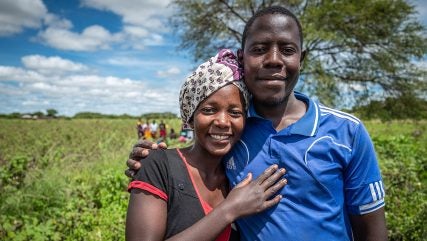
INTERNATIONAL
Dibella is once again increasing the use of Cotton made in Africa cotton according to the mass balance system. In 2025, the company will purchase 825 tons of raw fibres. This corresponds to an increase of 10% compared with the previous year. Dibella has been implementing Cotton made in Africa (CmiA) cotton in its supply chain in accordance with the mass balance system since 2017, thereby supporting socially and ecologically sustainable cotton production in Africa. With this further increase, Dibella is fulfilling its corporate goal of “increasing the use of sustainable fibres”.
The mass balance system allows the raw cotton to be easily implemented in the production process at Dibella’s suppliers, while at the same time having a high impact on African cotton farmers. The license costs incurred are borne by Dibella and are not passed on to customers. In this way, Dibella aims to raise awareness for more sustainable raw fiber production, away from cost discussions.
The advantages of CmiA
Cotton made in Africa cotton causes up to 13% less greenhouse gas emissions compared to the global average. No artificial irrigation is used during cultivation. This not only saves drinking water, but also protects valuable water resources in regions that are often affected by water shortages. Not using genetically modified seeds protects natural biodiversity. This specific example shows just how much the cotton farmers benefit: In Côte d’Ivoire, the income of farming families from the sale of CmiA cotton increased by almost 18% between 2015 and 2020, according to an independent study* commissioned to assess CmiA’s activities and their impact.
“At Dibella, we are proud of our partnership with the CmiA initiative, an internationally recognised standard for sustainable cotton grown by African smallholder farmers. Through our collaboration, smallholder farmers can deepen their knowledge of sustainable agriculture and environmental protection. The CmiA-verified cotton that we demand for our products has a significantly lower impact on the environment than conventional cotton and supports village communities in Africa,” says Michaela Gnass, CSR manager at Dibella.
Further information can be found at: www.cottonmadeinafrica.org/massbalance
An initiative of the Aid by Trade Foundation
* Reference to the study in Côte d’Ivoire World Cotton Day – Studienergebnisse zeigen positiven Einfluss der Schulungen und des Verifizierungssystems von Cotton made in Africa auf Leben der Kleinbauern | CmiA
BENEFICIAL RESULT: Cotton farmers from Tanzania will benefit from Dibella’ s move. PHOTO: ©Martin J. Kielmann for Cotton made in Africa






